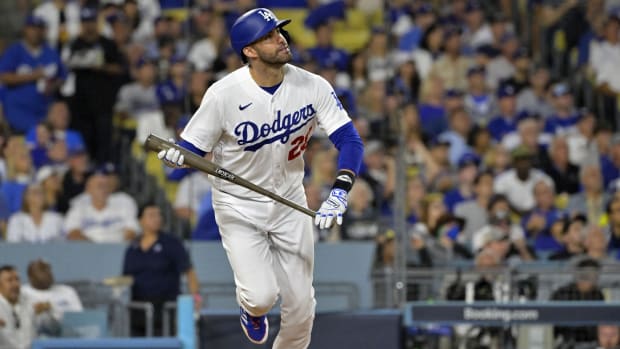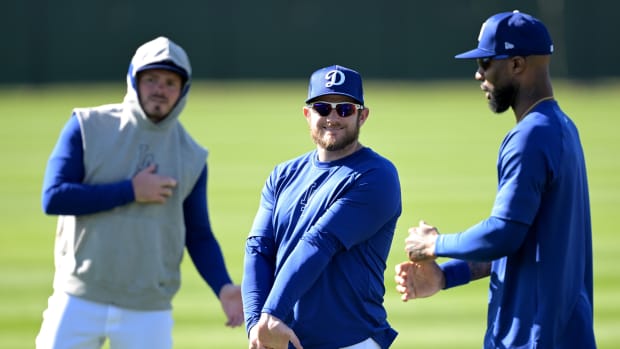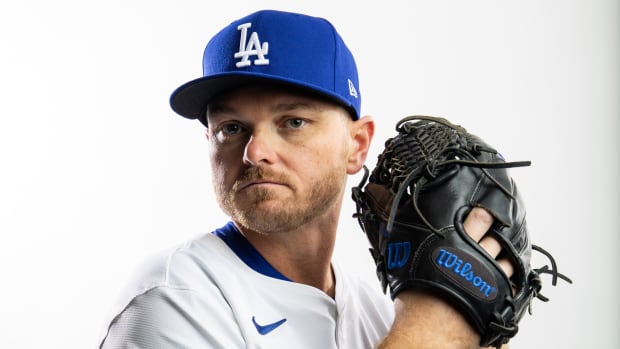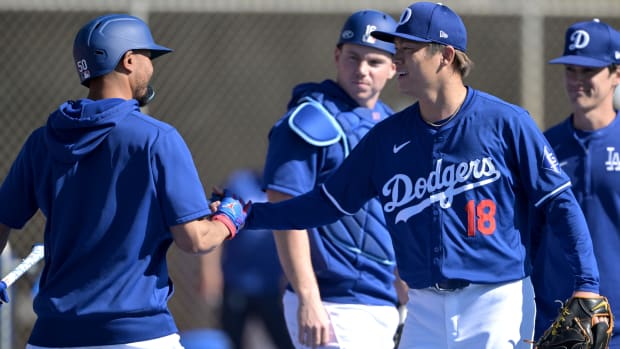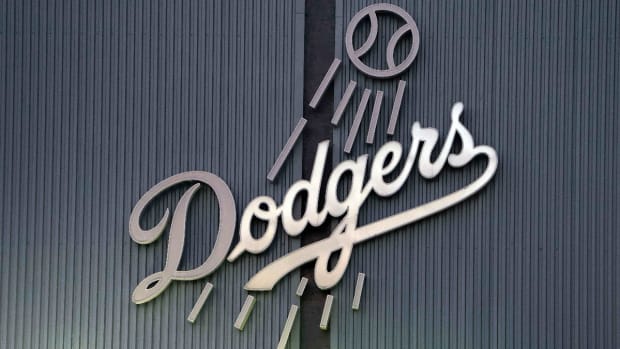Awards Watch: Dodgers Still in the Mix as NL Awards Come Down to the Wire
The final weekend of Major League Baseball’s abbreviated 2020 regular season is upon us. The Dodgers have clinched both their division and the top seed in this year’s expanded playoffs. Their opponent for this weekend’s final three-game set, the cross-town Angels, will be eliminated from the postseason for the sixth straight season with a single loss or an lone Astros win this weekend. On a team level, this weekend’s final series is meaningless, so let’s turn our attention back to the Baseball Writers’ Association of America awards with another edition of Awards Watch.
As was the case two and a half weeks ago, the Dodgers have put forth legitimate contenders for all three awards—the Rookie of the Year, Cy Young, and Most Valuable player. It now seems safe to say that a Dodger will not win the Cy Young, but there is a real chance that members of the local nine could claim the other two honors. What follows is my reading of how the races for those three awards, and the Dodgers’ top contenders for each, stand entering the final weekend.
All stats are through Thursday, September 24. League leaders are in bold, major league leaders in bold and italics. Rookies are players who, prior to the current season, had fewer than 130 at-bats or 50 innings pitched in the majors or spent fewer than 45 days on the active roster prior to rosters expanding on Sept. 1.
Cy Young
1. Trevor Bauer, RHP, Reds
1.73 ERA (275 ERA+), 73 IP, 11 GS, 6.6 IP/GS, 5.88 K/BB, 12.3 K/9, 1.1 HR/9, 0.79 WHIP, 2.87 FIP, 2.93 DRA
Bauer was not shy about his belief that he had sewn up his first Cy Young award after his dominant final start of the season Wednesday night against the Brewers (whom the Reds are battling for one of the final playoff spots in the National League). He probably isn’t wrong about that. Over his final four starts of the regular season, Bauer posted a 1.24 ERA and 0.69 WHIP across 29 innings (nearly 7 1/3 per start), striking out 39 against just four walks and three homers, including eight innings of one-run ball against Milwaukee on Wednesday. That set his final season line at the above, which is clearly the best in the NL heading into Friday night’s action.
The three pitchers directly behind Bauer in these rankings will all start one more time this weekend, but even if they all throw shutouts, they’re likely to fall just shy of Bauer, particularly when it comes to that sparkling ERA+. Bauer leads the the NL in ERA, ERA+, WHIP, and strikeouts (100), as well as complete games and shutouts (two of each, though both were seven-inning nightcaps in doubleheaders). Other might still catch him in all of those categories with the exception of ERA and ERA+, and those categories will likely be the difference in the race.
2. Dinelson Lamet, RHP, Padres
2.07 ERA (206 ERA+), 65 1/3 IP, 11 GS, 5.9 IP/GS, 4.68 K/BB, 12.3 K/9, 0.7 HR/9, 0.87 WHIP, 2.50 FIP, 3.18 DRA
Lamet’s final regular-season start will come Friday night in the opener of the Padres’ doubleheader in San Francisco. Over his last three starts, Lamet has posted a 0.87 ERA while averaging seven innings and 11 strikeouts per game. If he strikes out 11 Friday night, he’ll tie Bauer for the league lead with 100 strikeouts. However, Lamet would have to be perfect for all seven innings to pass Bauer in WHIP, and even if he is, he’d still finish behind Bauer with a 1.87 ERA in 72 1/3 innings.
3. Yu Darvish, RHP, Cubs
2.22 ERA (200 ERA+), 69 IP, 11 GS, 6.3 IP/GS, 6.77 K/BB, 11.5 K/9, 0.7 HR/9, 1.00 WHIP, 2.22 FIP, 3.37 DRA
Darvish leads this trio of runners-up in innings and strikeout-to-walk ratio and has a good chance of besting Bauer in both metrics after making his final regular-season start Friday night against the White Sox. Still, Darvish is even further behind than Lamet in ERA and ERA+, well behind the others in WHIP and strikeout rate, and would need a season-high 12 strikeouts to catch Bauer in total Ks. Darvish was leading this race three weeks ago, but a 4.26 ERA over his last three starts has put the hardware just out of reach.
[Follow Sports Illustrated’s Inside the Dodgers on Twitter.]
4. Jacob deGrom, RHP, Mets
2.14 ERA (197 ERA+), 63 IP, 11 GS, 5.7 IP/GS, 5.88 K/BB, 13.4 K/9, 0.7 HR/9, 0.92 WHIP, 1.99 FIP, 2.52 DRA
Jacob deGrom had a 1.67 ERA after making his ninth start of the season two weeks ago, but a hamstring spasm in his tenth start appears to have cost him a very real chance to win his third straight Cy Young award. The Mets’ righty gave up three runs in the second inning of that start, then was pulled due to the bad hammy. That not only suppressed his inning and strikeout totals (though he still needs just six of the latter to surpass Bauer), it inflated his ERA by 42 points (0.42 runs). Jake was back to his dominant self in his next outing, his last as of this writing, but the damage has been done. He will finish his season in Washington against the Nationals on Saturday, but his best hope in this race is a, still incredibly impressive, second-place finish.
5. Corbin Burnes, RHP, Brewers
2.11 ERA (215 ERA+), 59 2/3 IP, 9/12GS, 5.0 IP/G, 3.67 K/BB, 13.3 K/9, 0.3 HR/9, 1.02 WHIP, 2.03 FIP, 2.75 DRA
Burnes’ regular season came to an unfortunate end Thursday night against the Cardinals. In a valiant effort to help the Brewers reach the postseason, he tried to pitch through lower back pain only to be driven from the game by that pain with two outs in the fourth after he had allowed three runs, two on just the second home run he’d allowed all season. That was enough to raise Burnes’ ERA 34 points (0.34 runs) and end his Cy Young hopes. Still, this was a remarkable season for the 25-year-old righty, who went from working a bulk-innings role out of the bullpen in early August to peeling off a 0.30 ERA with 47 strikeouts and no home runs allowed over 29 2/3 innings in the five starts that preceded his disappointing finish on Thursday.
6. Clayton Kershaw, LHP, Dodgers
2.15 (196 ERA+), 54 1/3 IP, 9 GS, 6.0 IP/GS, 7.38 K/BB, 9.8 K9, 1.0 HR/9, 0.76 WHIP, 2.94 FIP, 3.14 DRA
Kershaw will start Friday night’s opener against the Angels, which, like Darvish and Lamet, will put him on regular rest for Game 1 of the Wild Card Series on Wednesday. Kershaw has a good chance to surpass Burnes with a good outing against the Halos, but, primarily because of the back injury that delayed the start of his season, he has no chance to break into the top four without help from a disaster start by one of Lamet, Darvish, or deGrom. Still, like Burnes, Kershaw should be proud of his performance this season, with which he reestablished himself as the Dodgers’ ace. With that one start remaining, he has posted his best ERA, ERA+, WHIP, and strikeout-to-walk ratio since 2016, and his strikeout rate and velocity have been his best since 2017.
7. Max Fried, LHP, Braves
2.25 ERA (213 ERA+), 56 IP, 11 GS, 5.1 IP/GS, 2.63 K/BB, 8.0 K/9, 0.3 HR/9, 1.09 WHIP, 3.10 FIP, 3.21 DRA
Fried had a 1.98 ERA after his first start of September but has been healthy enough to throw just six more innings since then. Worse yet, those six innings were enough for Fried to allow his first home runs of the season and inflate his ERA by 27 points (0.27 runs). Most recently, he tweaked his left ankle on Wednesday night, prompting his departure after a single inning of work, though the Braves still expect him to start the first game of their Wild Card Series on Wednesday. I purposefully ignore won-loss record in these rankings, but it’s still worth noting that Fried may fair better in the actual voting than on this list due to his 7-0 record. His seven wins currently lead the NL (tied with Darvish and Zach Davies), and Fried is the only pitcher with at least five decisions this year not to have been charged with a loss.
Rookie of the Year
1. Jake Cronenworth, 2B/IF, Padres
.304/.376/.509 (143 OPS+), 181 PA, 4 HR, 18 BB, 27 K
2. Tony Gonsolin, RHP, Dodgers
1.77 ERA (239 ERA+), 40 2/3 IP, 7/8 GS, 5.1 IP/G, 5.71 K/BB, 8.9 K/9, 0.4 HR/9, 0.79 WHIP, 2.44 FIP, 3.70 DRA
3. Devin Williams, RHP, Brewers
0.36 ERA (1268 ERA+), 25 IP, 21 G, 1.2 IP/G, 5.78 K/BB, 18.7 K/9, 0.4 HR/9, 0.60 WHIP, 0.74 FIP, 2.08 DRA
Out of a strong crop of rookies in the National League this year, the Rookie of the Year race appears to have come down to the three 26-year-olds above, all of whom will get a chance make a final push for the award this weekend. These three are a difficult trio to rank, as they each have very different roles. Williams, who just turned 26 on Monday, has been the most dominant, thanks to a changeup/screwball hybrid that Pitching Ninja’s Rob Friedman has dubbed the “Airbender.” However, because Williams is a short reliever, his dominance has spanned just 61 percent as many innings as Dodgers starter Gonsolin’s excellence. Unlike some of his fellow rookie starters, such as Cardinals lefty Kwang Hyun Kim (1.62 ERA in 39 innings but a mere 2.00 K/BB), Gonsolin has extended that excellence right through is statline via a strikeout-to-walk ratio and WHIP that are within shouting distance of Williams’. Then there’s Cronenworth, an everyday player who has excelled both at the plate and in the field and adds defensive flexibility (he has made multiple starts at second base, first base, and shortstop, and played an inning at third base, as well) to his overall value.
There are many ways to try to sort them out, wins above replacement being the obvious one, but before I get to that, let’s consider just how much of a full season each has had. If we convert their playing time in the 56 games their teams have played thus far (57 for the Dodgers) we get 72 1/3 innings in 61 games for Williams, a hearty reliever’s workload; 115 2/3 innings in 23 starts for Gonsolin, a little more than half of an ace’s workload; and 524 plate appearances for Cronenworth, just shy of a full season for a regular position player. Those more familiar numbers make it easier to see why WAR favors Cronenworth despite the fact that he has been the least dominant (as measured by the adjusted “plus” stat, OPS+ or ERA+) within that playing time.
Here are their wins above replacement figures from Baseball-Reference, FranGraphs, and Baseball Prospectus, respectively:
Baseball Prospectus can’t seem to sort these three out, either, and, even after combining all three WAR formulas, Gonsolin and Williams remain in a virtual tie. I have Gonsolin above Williams above in part because I think he has a better chance of helping his own cause this weekend, as he’ll likely draw the Saturday start against the Angels as a warm-up/audition for a spot in the postseason rotation (though the audition idea is ludicrous, in my opinion). Also, while Cronenworth remains on top for now, he has been slumping at the plate this month (.217/.319/.317). With Gonsolin starting Saturday, and the Padres and Brewers each playing four games this weekend (with doubleheaders on Friday), these three could yet finish in any order, and the final vote should be very close among them.
Honorable mention to Kim, Braves righty Ian Anderson, the Dodgers’ own Dustin May (who is likely to start Sunday’s season finale against the Angels), Phillies corner infielder Alec Bohm (who has graded out poorly in the field but has raked at the plate), Mets lefty David Peterson, slick-fielding Pirates third baseman Ke’Bryan Hayes, and Marlins righty Sixto Sánchez.
Most Valuable Player
The problem with a 60-game baseball season is that, while it is enough time to sort out the good from the bad, it isn’t enough time to sort out the great from the good. That hasn’t been a problem in the American League, where every team is clearly either good or bad. However, we have seen the problem manifest in the National League where, entering the final weekend, six teams are clustered within a two-game span for the final four playoff spots (a six-way tie is vanishingly unlikely, but still possible), and two others have yet to be eliminated.
The NL’s Most Valuable Player race is in a similar bind. A good argument could be made for any of the following five players, and, to my eye, there just hasn’t been enough season to create any meaningful separation between them. I could more easily be convinced that one of my honorable mentions deserves to be added to the top five than I could that any of the following five has clearly been the best player in the league this year. That said, I have to rank them, and a combination of objective and subjective criteria have resulted in the following, though the group is tight enough that a surge or slump by any of the top four this weekend could change the order entirely.
1. Mookie Betts, CF, Dodgers
.293/.363/.567 (150 OPS+), 240 PA, 16 HR, 23 BB, 38 K, 9 SB (82%)
I do my best to put personal biases aside when making these lists, but I came into this season with an extremely high opinion of Betts as both a player and a person, and, having now watched all but a handful of his games this year, he has only risen in my estimation. I have always given Betts ample credit in these lists for his contributions in the field and on the bases, which are elite and do show up in the advanced metrics, but, watching him every day, he is better in both facets of the game that I realized. I knew he had great range in right field, but I didn’t have a full appreciation of his arm or of his ability to position himself to quickly return the ball to the infield. I knew he was a fast and smart baserunner, but the frequency with which he takes bases other baserunners wouldn’t constantly surprises me. As a longtime baseball fan, I have an internal sense of which balls will drop, how quickly an outfielder will get a ball back to the infield, and when a baserunner will take an extra base. Betts consistently upends those expectations for the better.
Those are extremely valuable skills in addition to Mookie’s more easily quantified plate production, and they raise him above the other hitters on this list, who have out-hit him to varying degrees per OPS+ but fall short in one or both of those other areas. That’s not just me talking. Here are the top three players in the NL according to the “average wins above replacement” figure I used for the rookies above:
WAR isn’t a precise-enough figure to put much stock in the differences in that table. Still, Betts has Machado beat according to each of those three formulas and is effectively tied with Freeman overall. Given that tie, I’d rather reward an all-around contributor like Betts than a player like Freeman who only excels at the plate. Still, Betts’ first-place ranking remains tentative. Much could change this weekend, and I still don’t have a clear sense of how the writers are likely to vote.
2. Manny Machado, 3B, Padres
.313/.376/.603 (166 OPS+), 242 PA, 16 HR, 24 BB, 34 K, 6 SB (67%)
Again, I’m favoring all-around game over more easily measured hitting production here. Machado, who is three months younger than Betts, is not a good baserunner, but his fielding has rebounded after he spent last year readjusting to third base, and he has out-hit Betts on the season. Machado has also now clearly surpassed his teammate Fernando Tatis Jr. as the best player on what has arguably been the NL’s most exciting team this season. Machado is making a late surge (.375/.423/.708 over his last 13 games and 52 plate appearances) that could very well earn him his first MVP award.
3. Fernando Tatis Jr., SS, Padres
.278/.369/.561 (154 OPS+), 244 PA, 15 HR, 26 BB, 59 K, 11 SB (79%)
Speaking of Tatis, why is he not included in that table above? Part of it is that Baseball Prospectus’s fielding statistic, Fielding Runs Above Average, crushes his WARP total down to 0.8, dragging his overall average down to 2.0. Having seen Tatis play, I consider that a fluky small-sample fielding result and throw it out. Still, even if you do that, Tatis averages 2.6 wins above replacement in the other two WAR stats, and thus trails the other three hitters in this top five (Betts: 3.0; Freeman: 2.9; Machado: 2.8). This seemed like Tatis’s award to lose three weeks ago, but he has done a lot to lose it, hitting just .140/.224/.163 over his last dozen games spanning 49 plate appearances. Still, he caused such a sensation earlier this year, and has such a tremendous all-around game, that a strong finish this weekend might be all the excuse many voters need to revert to placing his name atop their ballots.
4. Freddie Freeman, 1B, Braves
.338/.456/.628 (181 OPS+), 252 PA, 12 HR, 42 BB, 37 K
By now, any Braves fans reading this (are there any Braves fans reading this?) are probably cursing at me. Didn’t I just show that Freeman leads the NL in wins above replacement according to both FanGraphs and Baseball Prospectus? Doesn’t he have by far the best overall batting line and the most plate appearances of this bunch? Yes, all of that is true. However, I don’t think that Freeman’s batting line is so far ahead of the others that it should put a slow first-baseman with an average glove ahead of a shortstop who rakes, runs, and fields, an elite defensive third baseman who is the closest of the bunch to Freeman in raw hitting production, or a thrillingly athletic outfielder who is elite in every facet of the game. I also said up top that this group is bunched tightly enough that any of them could stake claim to the MVP award with a strong finish this weekend. That applies to Freeman as much as the others.
5. Trevor Bauer, RHP, Reds
1.73 ERA (275 ERA+), 73 IP, 11 GS, 6.6 IP/GS, 5.88 K/BB, 12.3 K/9, 1.1 HR/9, 0.79 WHIP, 2.87 FIP, 2.93 DRA
Okay, so Bauer can’t have a strong finish this weekend, because he made his last start of the regular season on Wednesday. Still, if the other four have disastrous weekends (which means big 0-fers, not injuries), a statistical argument could be made that Bauer deserves the award. He is currently a close fourth in average WAR (2.5), besting Freeman in bWAR (2.8 to 2.6) and tying Machado in WARP, and still edges out Tatis in the average after we eliminate WARP (2.7 to 2.6). I don’t think there’s any real chance of Bauer claiming this award, both because the writers won’t give the MVP to a pitcher unless there’s a dearth of good hitting candidates and the pitcher’s dominance relative to the rest of the league is undeniable, and because Bauer is largely regarded as a selfish player and, frankly, a jerk. Then again, he has played a huge role in the Reds maybe possibly sneaking into the expanded playoffs. Neither personality nor team performance influences my MVP rankings (team performance should be irrelevant to an individual award—that’s why there are no wins, loses, RBI, or runs in the stat lines here—and none of us are in the clubhouse enough, or at all this season, to judge a player’s behavior off the field). Still, team performance, especially, does influence the electorate at large. With or without that consideration, Bauer deserves to be a serious part of the conversation for this award, but I will be shocked if he wins it.
As for the other Dodger who is likely to get some down-ballot MVP votes, Corey Seager is somewhere in the middle of a group of honorable mentions that also includes Juan Soto, Trevor Story, Trea Turner, Mike Yastrzemski, Ronald Acuña Jr., Marcell Ozuna, and Michael Conforto, as well as the Cy Young runners-up, which means Clayton Kershaw, too.
Finally, I’ve limited this column to the NL out of consideration for both your time and mine, but, without further explanation, if forced to pick the AL award winners entering the final weekend, I’d give all three to a pair of 25-year-olds. The AL Rookie of the Year should go to Mariners centerfielder Kyle Lewis, and both the Cy Young and MVP should go to Cleveland righty Shane Bieber. I consider all three relatively easy selections, but it remains to be seen if the writers will concede on the MVP.
Cliff Corcoran covers baseball for The Athletic and is a former lead baseball writer for SI.com. The co-author or editor of 13 baseball books, including seven Baseball Prospectus annuals, he has also written for USA Today, SB Nation, Baseball Prospectus, Sports on Earth, The Hardball Times, and Boston.com, among others. He has been a semi-regular guest analyst on the MLB Network and can be heard more regularly on The Infinite Inning podcast with Steven Goldman. Follow Cliff on Twitter @CliffCorcoran.


